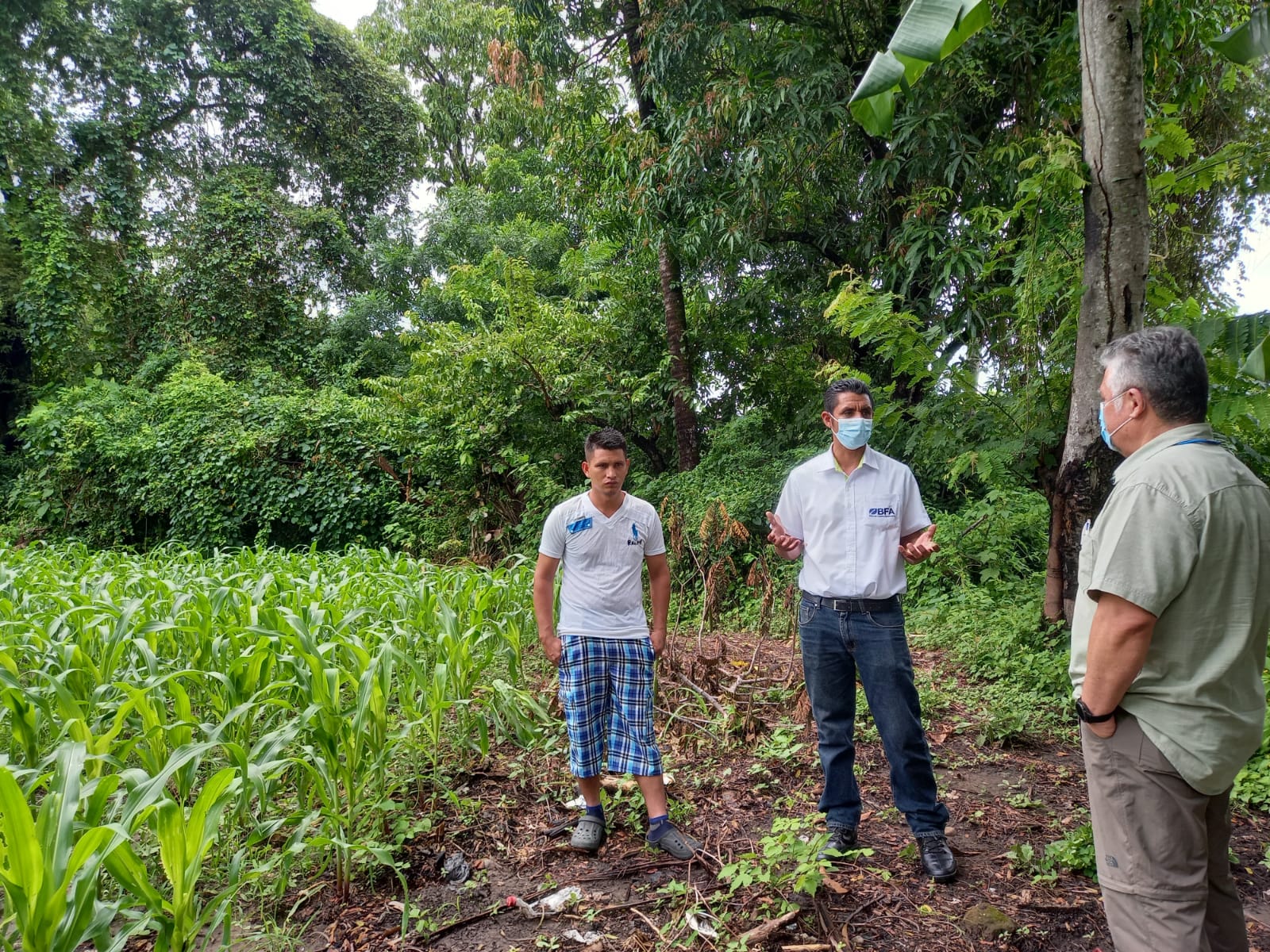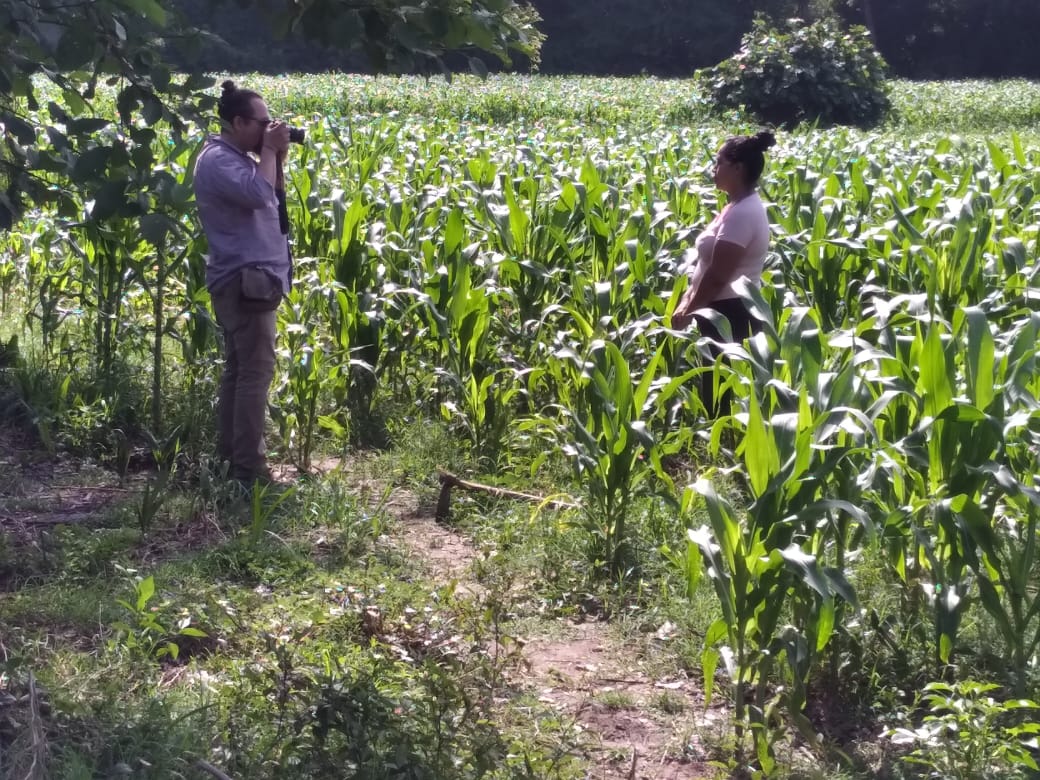Compilation of Climate Justice Advocacy
Good Practices of Local to Global Action
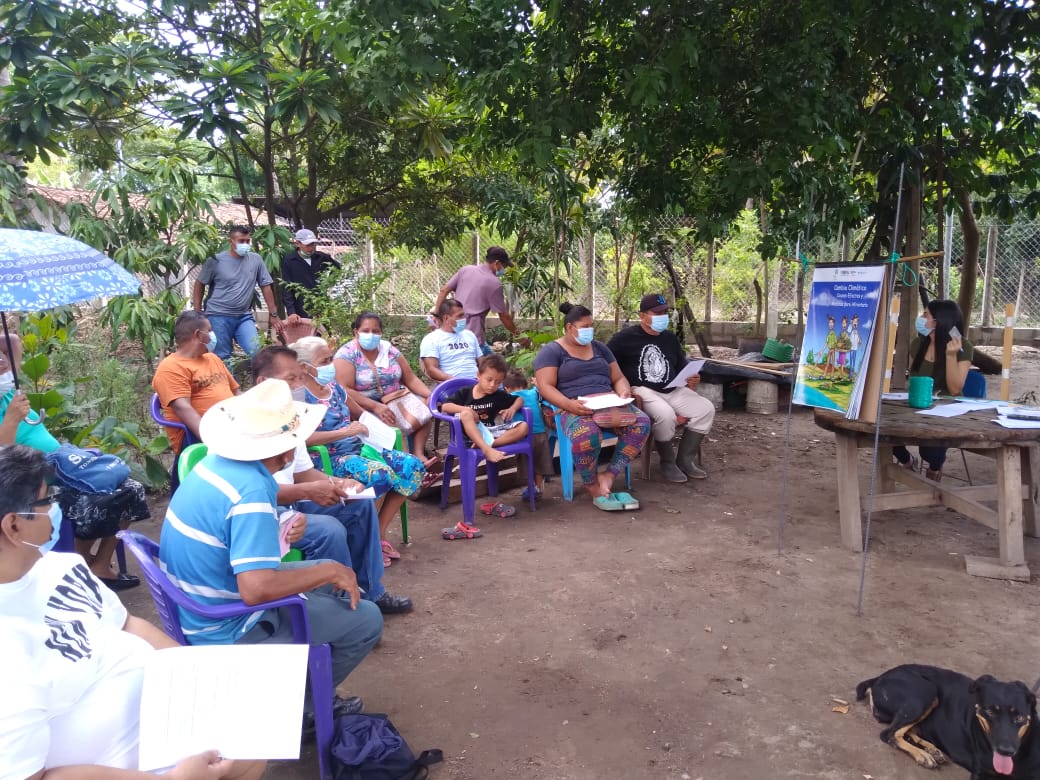
Overview
PROJECT DURATION
March 2021 to August 2022 (Phase 1); May to October 2023 (Phase 2).
BUDGET AND FUNDING
Phase 1: USD 70,000, Candian Lutheran World Relief, Canadian Food Grains Bank, Canadian Social Science and Humanities Research Council, University of Toronto, and the Lutheran World Federation.
Phase 2: USD 15,000, Manitoba Council for International Cooperation
SNAPSHOT
This initiative was designed to address adaptation and mitigation to climate change and focuses on addressing losses and damages from climate change. This project supported nearly 300 vulnerable farmers in the dry corridor of El Salvador to cope with climate-related losses and damages. It provided microclimate insurance along with adaptation practices to increase resilience.
IMPLEMENTATION
The Lutheran World Federation Central America World Service Country Program. Co-implemented by Agricultural Development Bank (BFA).

The project targeted communities in the dry corridor of Central America, an area susceptible to extreme rainfall, persistent droughts, and floods. As a consequence of these conditions, a vast number of households in El Salvador regularly suffer from chronic food insecurity.
The LWF proposed a highly relevant pilot project to this context, as this microclimate insurance initiative aimed to prevent, minimize, and compensate for the losses and damages that surpass the capacity of small-scale farmers’ adaptation to climate change.
The first phase of the pilot project (March 2021 – August 2022) targeted the departments of San Miguel, Usulután, San Vicente, and La Paz. It focused on facilitating access to microclimate insurance for vulnerable smallholder farmers who are currently accessing loans from the Banco Nacional de Fomento Agropecuario (BFA) but are at risk of defaulting over 12 months.
The incentive consisted of a subsidy of 50% of the insurance cost (going from USD 100 to USD 3,000) to create additional motivation for farmers to sign up for the insurance, as this product was still largely unknown to them. Moreover, the project provided training on resilient agriculture.
The second phase of the project (May–October 2023) targeted the departments of La Paz, San Vicente, and Usulután and focused on a smaller insurance cost subsidy (25%) and on studying the impacts of microclimate insurance as a way of building up resilience to climate-related shocks for smallholder farmers.
The corresponding University of Toronto study is ongoing and aims to examine the impact of subsidization and assess the possibility of removing it entirely in future projects. Moreover, the study aims to measure and analyze the benefits of having an insurance with agricultural credits that reduces the risk of crop losses. In addition, there is an ongoing research collaboration with the University of Toronto to provide learnings directly from the execution of this project.
The LWF Central America Program previously partnered with the Banco Nacional de Fomento Agropecuario via workshops and public forums on the transfer of risks, losses, and damages caused by climate change under the Warsaw International Mechanism for Loss and Damage associated with Climate Change Impacts (WIM). In this context, the bank partnered with the LWF for the implementation of the project.
The project combined more traditional approaches to working with small-scale farmers in communities vulnerable to frequent climatic disasters.
This involved providing training and support to enhance their understanding of and access to resilient agricultural practices. Specifically, the project focused on training farmers in the preparation of green manures (organic products) that can improve soil quality, reduce reliance on chemical pesticides, and promote efficient water use for irrigation when available.
Subsequently, each participant was provided with a kit of items to support their training, including canavalia seeds, chicken manure, molasses, yeast, and plastic barrels for mixin manure. The project also facilitated access to parametric insurance for smallholder farmers, to protect them in the case of crop loss due to climatic disasters. Parametric insurance differs from traditional agricultural insurance (based on actual crop losses) available to small-scale farmers.
Other researchers have also noted that parametric insurance could be a very effective way to address the trap many small-holder farmers in developing countries fall into, namely, borrowing money to finance their inputs, losing those inputs to climate-related shocks, and falling further into debt or losing their livelihoods altogether.
Parametric insurance could also help avoid many of the pitfalls associated with traditional insurance, where compensation is provided through verifiable, but often subjective, losses. With weather (or climate) index insurance the payout is connected to an objective variable that neither the bank nor the farmer can control such as the level of rainfall. Therefore, this reduces (or even eliminates) the risk of disputes over whether a payout should be made.
Additionally, with traditional insurance, there can be an incentive for farmers to reduce their efforts to receive a payout which is a risk that does not exist with parametric insurance. (Source: Sibiko, K. W., Veettil, P. C. and Qaim, M., "Small Farmers' Preferences for Weather Index Insurance: Insights from Kenya," Agric & Food Secur 7 (2018): 53.
El Salvador, located in the dry corridor of Central America, is recognized as one of the most vulnerable countries to climate risks worldwide.
The increasing variability of rainfall and temperature poses a significant threat to the food security and livelihoods of smallholder farmers living in heavily deforested and hilly areas.
It has been predicted by the Intergovernmental Panel on Climate Change (IPCC) that by 2050 rising temperatures will reduce the yields of El Salvador’s primary crops by up to 30%. Crop simulation models predict that sorghum and maize yields could decrease by up to 20%, and dry bean yields could decrease by 50% by 2065 (Source: P. V. Vara Prasad, "Impact of Climate Change and Climate Variability on Productivity of Grain Crops," University of Nebraska INTSORMIL Presentations (2011), 46), having direct implications on food security, especially in the dry corridor of the country.
The locations targeted by the project are prone to excessive rainfall, prolonged droughts, heatwaves, and floods. Prolonged droughts have been increasingly affecting the area since 2014, and farmers have had less yield on their crops and trees every year.
Due to water scarcity, fruit trees including avocados, summer fruits, mangoes, bananas, and others, have experienced a reduction in their harvests.
As a consequence of these conditions, more than half of households in El Salvador are currently suffering from some degree of chronic food insecurity. Based on the latest data available from July and August 2021, over 800,000 people in El Salvador, which accounts for 13% of the population analyzed, faced severe levels of acute food insecurity categorized as crisis or worse (Integrated Food Security IPC Phase 3 and higher).
This situation was primarily attributed to the compounding effects of the COVID-19 pandemic, elevated food prices, and reduced family income. Their vulnerability is largely due to a dependence on traditional rainfed production systems, mainly centered around crops like maize, beans, and sorghum.
These agricultural practices contribute to soil degradation and leave them more susceptible to the impact of climate-related shocks and disruptions.
Agricultural producers increasingly rely on loans to support their crops. These loans are scheduled according to the agricultural calendar and are typically disbursed 12 months after the expected harvest. While these loans are essential for most farmers, they can also place them in a vulnerable position in the event of crop losses due to climate-related extreme weather events, which are common in the target area. Farmers are forced to rely even more heavily on credit, resulting in higher levels of indebtedness.
A recent LWF situational assessment found that 82% of respondents had resorted to coping strategies in the past year. These included selling personal food reserves, skipping meals, selling livestock and using savings to buy food.
In addition, many farmers are at risk of losing or have already lost their agricultural livelihoods. As a result, they have been forced to seek informal employment, underemployment, or migration to other countries, mostly the United States.
"I lost my plantation once, so I needed to sow twice with a bank credit. Therefore, I had to borrow money to pay the bank on time and prevent the delay from generating interest. That is why the project has been so beneficial because if there is a loss of crops, it will prevent me from owing the bank and losing the money I invested: this insurance guarantees that it will not happen to me again. Yes, I have walked alone, but now, with insurance, I am going to walk alongside with hope." (Marta Julia Ramirez, Participant in the Microclimate Insurance Pilot Project)
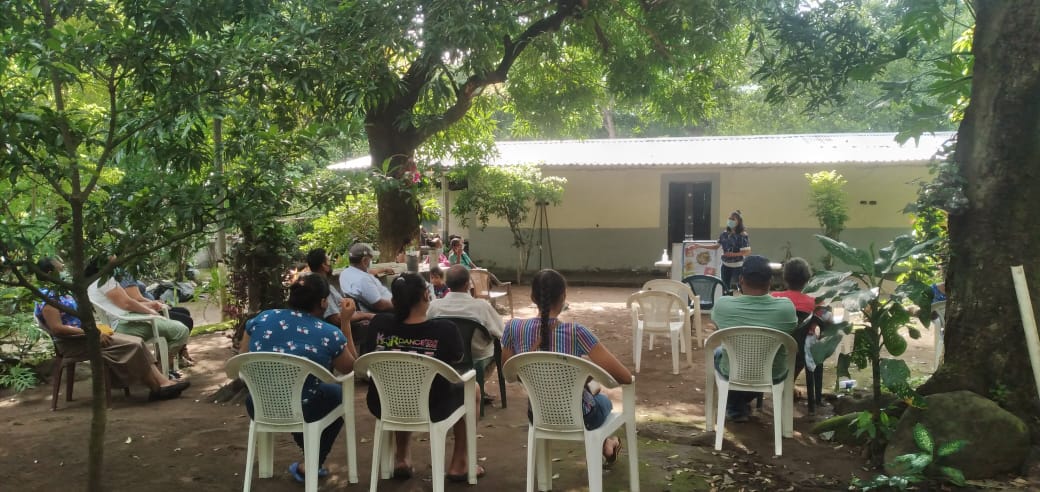
Strategies
Community education, awareness raising and capacity-building
Numerous communities adopt practices that harm soil moisture and fertility. One such example is the use of fire for land clearance, which results in the depletion of vegetation and trees. Consequently, the soil becomes vulnerable to the impact of rainfall and loses moisture through evaporation.
Moreover, this practice can lead to uncontrollable wildfires, causing damage to the remaining vegetation in the surrounding landscape. Therefore, the targeted communities were sensitized to the causes and direct effects of climate change on agriculture.
The main objective was to equip them with knowledge on understanding how to mitigate the impacts of climate change on the agricultural sector through the adoption of agroecological practices and alternative methods.
Participants were actively involved in the development of these practices through a hands-on learning approach.
To raise awareness among the community, an extensive multimedia campaign was implemented, encompassing the creation and adaptation of various materials such as flipcharts, technical guides, thematic videos, radio spots, and radio interviews.
The central idea conveyed through these materials emphasized the significance of micro-insurance as a critical measure to tackle the challenges posed by climate change. The training sessions were conducted over a span of four months, with weekly sessions attended by more than 296 participants.
In addition to the farmer training, the LWF provided four trainings to 483 technical and administrative officials at the national level of the Banco Nacional de Fomento Agropecuario agencies and the central headquarters. The main objective was to equip the staff to effectively promote parametric insurance. The trainings covered various topics, including climate change, coping strategies, and the mechanism of risk transfer through parametric microinsurance.
Climate risk transfer
The impact of climate change is evident in the undeniable fact that the world’s poorest countries and people, who have contributed the least to the climate crisis, bear the brunt of climate-induced loss and damage.
These adverse impacts push them further into vulnerability, poverty, and deeper levels of debt.
“This project is a case study where the state takes responsibility for the effects that climate change has on vulnerable populations, and it is part of acknowledging that the issue of losses and damages is not an effect caused by small producers. The theme of climate justice is that those who have contributed the least to climate change are being affected by something they did not cause. And it should be the responsibility of the state to protect them from such events. Moreover, it is a debt of developed countries to developing countries." (Mercedes Palacios, Regional Officer Disaster Risk Reduction and Climate Change of the Central America Program of LWF)
The impacts of climate change are distributed unevenly. Disasters have a far more destabilizing impact on less advanced economies. Developing countries are often more geographically exposed to climate-induced hazards, leading to higher socioeconomic vulnerability and limited technical and financial capacity to respond and recover. (Source: Seguros de riesgos climáticos y financiamiento del riesgo en el contexto de la justicia climática, 13)
Consequently, the limits to adaptation become more evident, leaving many communities unable to “maintain human-ecological systems in a safe operating space.” This exposes them to intolerable risks that threaten their health, safety, well-being, and overall sustainability.
Increased vulnerability to such risks is a fundamental characteristic of poverty, which can result in households and communities being trapped in a cycle of impoverishment. Likewise, mass displacement and migration could emerge as the most significant humanitarian challenges in the context of worsening climate change conditions, particularly in regions where livelihoods are severely impacted, and people have limited options for earning a living.
The prevention, minimization, and compensation of residual losses and damages that exceed the capacity of adaptation are becoming increasingly important to avert humanitarian, ecological, and development catastrophes.
These events have enormous potential to undermine peace and stability in the affected regions. To address these challenges, resilience must be enhanced through effective adaptation and comprehensive climate risk management.
In this context, faith-based organizations should play a more extensive role in climate risk insurance and financing at both levels: advocacy and programmatic work. They should focus on the needs and specific circumstances of vulnerable communities and how these approaches can include them and protect them better.
Local to Global to Local Approach
At the global level, Central America has been actively advocating for addressing the issue of losses and damages resulting from climate change, particularly within the framework of the Warsaw International Mechanism for Loss and Damage associated with Climate Change Impacts (WIM).
At the regional level, these instruments involve incorporating the responsibility of countries to provide indemnification, financial support, and risk reduction measures for the most affected sectors, such as the agricultural sector. From the local to the global level, discussions and climate negotiations have taken place involving various communities, including the case of El Salvador.
The primary goal of these discussions has been to ensure that national and international arrangements recognize and incorporate the responsibility of developed countries, in compensating for the losses they have inflicted on developing countries over the past four decades, due to their high-consumption lifestyles and associated emissions.
The incidence at the regional level emphasizes the incorporation of measures to hold the state responsible and accountable for indemnifying, supporting financially, and mitigating risks for the sectors most severely affected by climate change impacts, such as the agricultural sector.
"While various organizations are engaged in numberous local projects, their project effectiveness is dependent upon the protective and guaranteeing mechanisms within national and international instruments, which must encompass indemnification and risk transfer for these sectors. Without such safeguards, non-government organizations, like ours, may find themselves continunously implementing similar projects with diminishing impact." (Mercedes Palacios, Regional Officer, Disaster Risk Reduction and Climate Change, World Service Central America Programme)

Target Group
The beneficiaries are located in the departments of San Miguel, La Paz, San Vicente, and Usulután, in El Salvador. The targeted populations are small farmers or daily-wage earners, whose main sources of income are labor and the production of basic grains.
The main objective of the project, concerning the targeted communities, was to support farmers in the transition from traditional agriculture to an agriculture resilient to climate change. From these communities, 75% of small farmers are renting their land and 100% of households headed by women rent land for their crops.
More specifically, the beneficiaries consisted of vulnerable families residing in the dry corridor region, who primarily relied on subsistence agriculture for their livelihoods and frequently experienced crop losses and damages.
Additionally, a priority was placed on the participation of female heads of households, and families with migrant or forced-displaced relatives, due to the necessity for alternative livelihoods. The project also sought to involve families with children or individuals with disabilities present in their homes.
Women were given priority, but regrettably, only 15% of the beneficiaries were female due to El Salvador being a patriarchal country, where women generally lack land ownership. Nevertheless, numerous success stories emerged, with women like Patricia Vásquez Granadeño actively involved in empowering others (see below).
Patricia, a member of the Horizontes Nuevos collective in the La Paz department, has been actively involved in the Microclimate Insurance – Pilot Project as a community trainer. Additionally, she is part of a dedicated group of women who cultivate their own home gardens.
Her case is a great illustration of the focus the project has on empowering women.
"I enjoy sharing my knowledge with communities, specifically training women in accessing new opportunities and improving their conditions and income. My efforts extend beyond teaching; I also actively raise awareness about the impact of climate change and its negative consequences. Additionally, I balance my responsibilities as a mother and wife with my role as a teacher, all while nurturing my 17-year-old son." (Patricia Vásquez Granadeño, Community Trainer and Member of the Horizontes Nuevos Collective in the La Paz department)
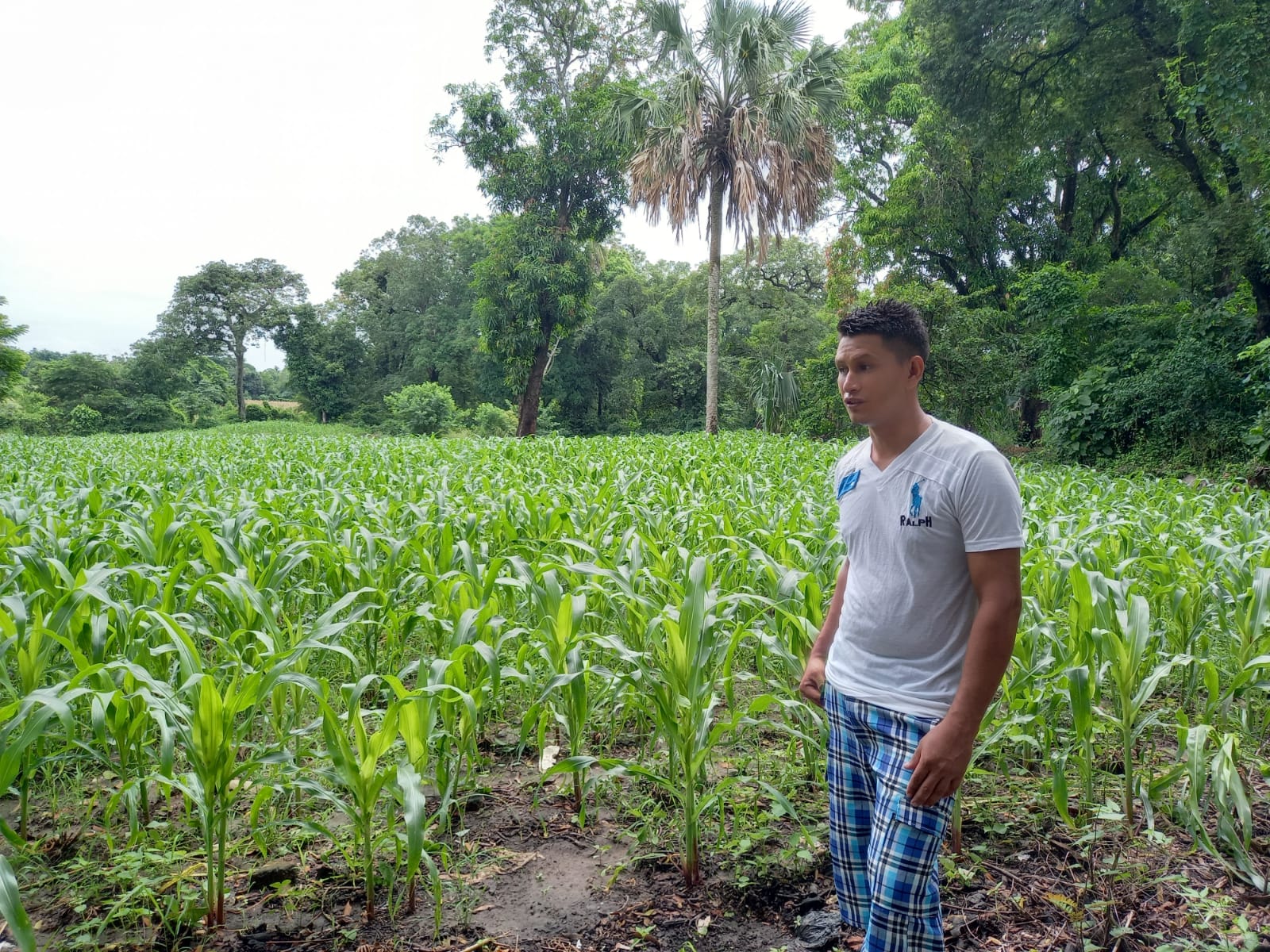
Impact
1.
Two hundred and ninety-four farmers have been directly sensitized on the effects of climate change and how parametric insurance could be a viable option in their context. Project participants now have a better understanding of the adaptation measures needed for food production and security.
2.
Out of the 294 farmers trained, 247 obtained 75% on a post-training test, 114 being women and 133 men. This outcome validates the impact that training had on increasing their awareness.
3.
Four hundred and eighty-three staff from the Banco de Fomento Agropecuario have been trained and have the necessary knowledge to promote parametric insurance and support farmers.

Replicability
This pilot project is crucial, not only from a development perspective, but also as a response to slow-onset catastrophes that are more common as global warming approaches 1.5°C. The United Nations Climate Change Conference COP27 agreed to provide “loss and damage” funding for vulnerable countries hit hard by climate disasters.
"The project should be replicated in every developing country that is suffering the consequences of climate change, especially those with vulnerable communities depending on agriculture. The transfer of responsibility should no longer be negotiable. It should be a state initiative and it should be the national or international authorities that decide who should finance the risks and losses assumed by the agricultural sector.
The agricultural sector has experienced significant hardships in recent years, leading to a decline in the continuation of family planting traditions among young people who are migrating to urban centers or abroad. Even families with a long history of farming have been compelled to abandon their fields after facing repeated crop losses due to climate change.
Consequently, this has resulted in reduced local production and a greater reliance on imports, exacerbating the destabilization of the territorial organization. To address these pressing challenges, the implementation of the project in vulnerable developing countries is paramount, ensuring sustainable agricultural practices and curbing the migration of rural populations to urban areas and abroad." (Mercedes Palacios, Regional Officer Disaster Risk Reduction and Climate Change, World Service Central America Programme)


